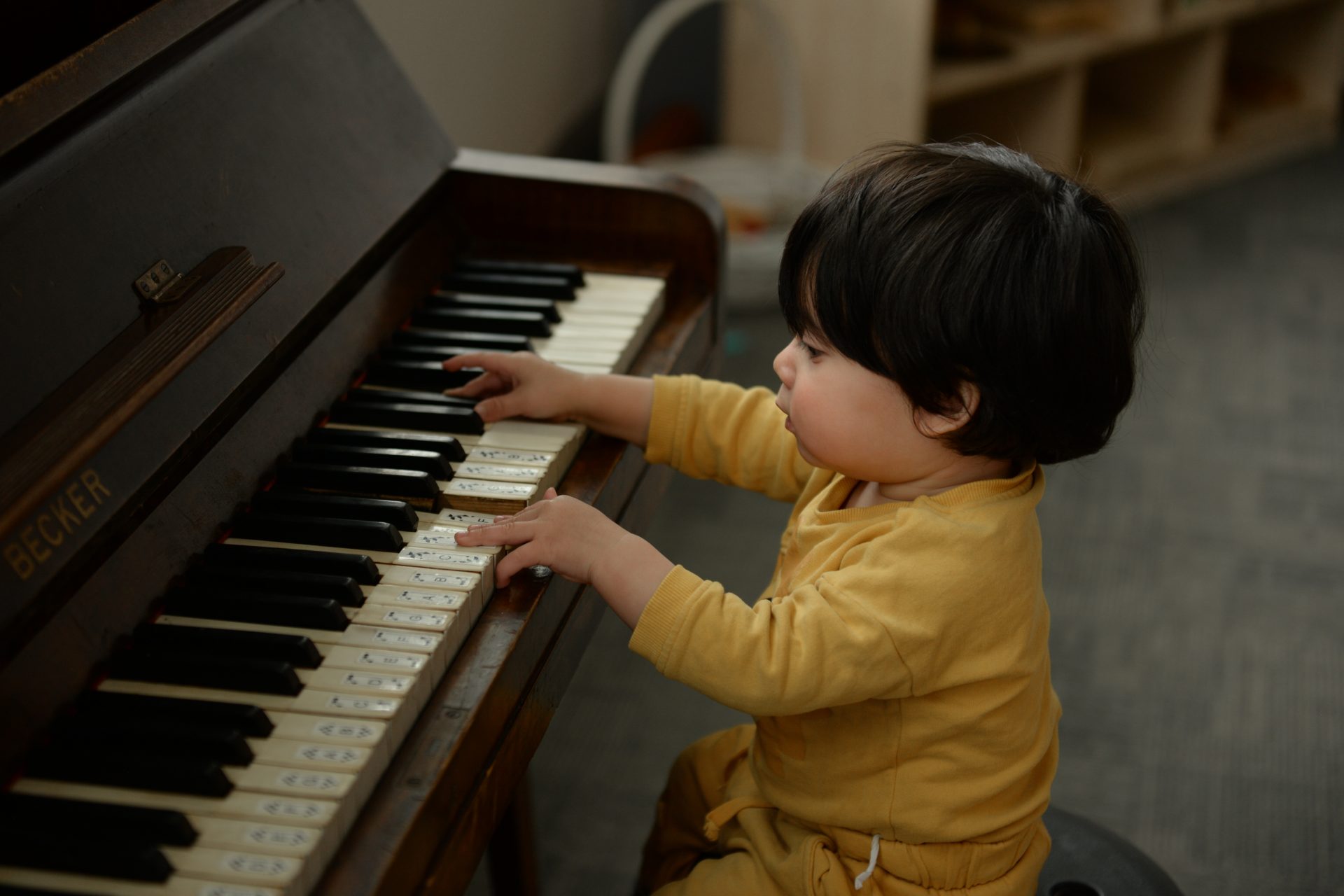
Music and movement are powerful tools that can be introduced into the learning environment from nursery to toddlers and pre-school. From gentle swaying and singing when holding a baby through to encouraging toddlers and pre-schoolers to explore how to move to tunes and sound, these actions promote so much more than just a lifelong love of music.
Children naturally form an association with music and sound. From a calming background noise as they fall asleep to the rousing chants of favourite childhood rhymes, music exerts a powerful influence on child development.
This is firmly integrated into the Reggio Emilia philosophy, where the encouragement of creativity and self-exploration is at the forefront of the approach. The use of music in the early childhood environment plays a crucial role in development.
- Developing motor skills: Clapping, stomping, nodding, jumping… The natural inclination to move to a musical beat is a wonderful way to hone the art of motion. As a child grows and becomes more confident in how their body functions, these movements help with the development of balance and coordination. Learning to use instruments – such as banging a drum, hitting a tambourine or pinging a triangle is a wonderful way to learn hand-eye coordination, dexterity and hone finer motor skills.
- Cognitive development: A child’s neural network is developing at a tremendous pace. Recognition of sounds and familiar tunes helps with memory development, dancing increases spatial awareness and learning songs promotes recognition and attention span.
- Emotional development: Music is a wonderful medium for expression. Dancing, singing, even sitting quietly with music playing in the background creates a great landscape for children to begin to learn to recognise, express, understand and control their emotions.
- Social development: Group activities where children sing and dance together are great ways to build bonds with others, learn about teamwork and form relationships with others.
- Learning language and developing communication skills: Singing, rhymes, chanting… All help children increase their vocabulary, learn about self-expression and communicate verbally and non-verbally with those around them. The beauty of music, dance and movement expresses so much more than simple words. Body language, facial expressions and learning how to articulate feelings and thoughts in multiple different ways is enhanced through the joy and power of music.
Music and movement play an active role in the Reggio Emilia approach. Early education providers can integrate this in many ways, including:
- Playing age-appropriate musical instruments – from toddlers banging on drums to pre-schoolers learning the art of chime bells or even more difficult instruments, such as the recorder, making music is something that’s well-received and that has a dramatic and positive influence during the early formative years.
- Good old-fashioned singing and nursery rhyme time…
- Musical games, such as musical statues and musical chairs – or let the children invent games that involve music, singing and dancing.
- Using music and movement during story telling. A song, movement or dance is all it takes to turn a simple tale into a wondrous journey into whatever imaginary world is being talked about. Such attributes can also be woven into educational subjects, such as those with a gentle environmental undertone. Storytelling isn’t known as an ‘art’ for no reason… And nothing is more enrapturing than a child or group of children hanging onto every word – something that a well-timed song or dance can truly bring to life.
- Mindfulness activities – including quiet time and breathing exercises to a background of soothing sounds.
Music is part and parcel of life at Evoke Early Learning Centres. From the soothing sounds and cuddles in the nursery to the joy of toddlers indulging in noisy musical play and the dance routines of Kindy, it’s just one of the elements that make the Evoke environment such a happy, progressive, welcoming and beneficial home-from-home for the children in our care.
Contact our team today to find out more.

Tracey is a highly qualified educator and administrator and brings a strong combination of academic achievement, extensive work experience in the education and business sectors as well as drive and passion to her role as General Manager of Operations at Evoke Early Learning.
Tracey has a Master of Education and an Advanced Diploma of Business and holds VIT Dual Registration to teach in Early Childhood and Primary School settings. She’s also a VIT Trained Mentor Teacher and has worked in ECEC settings as a Director, Educational Leader and as a Victorian Senior Area manager. Her recognition as a state finalist in the recent Director of the Year Awards is testament to her achievements in the early education sector.
Her extensive work experience also included a stint as Head of Curriculum at the Royal Children’s Hospital Education Institute and positions as head of ICT at a number of large primary and secondary schools. Tracey is also experienced in not-for-profit sessional kindergarten settings and long daycare environments, so she has a deep understanding of what’s required to support the needs and expectations of young children, educators, parents and caregivers.
Tracey is responsible for operational management at Evoke Early Learning’s Clayton centre in Oakleigh East and their Albert Park centre in South Melbourne and is deeply committed to leading and driving effective and sustainable service delivery throughout the company.
Tracey is passionate about making a meaningful difference to young children, their parents and the wider community and under her expert guidance, Evoke Early Learning is continuing to raise the bar in quality early education and childcare.


